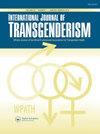Health-related quality of life in transgender adolescents: Associations with body image and emotional and behavioral problems
Q1 Social Sciences
引用次数: 26
Abstract
ABSTRACT Background: Transgender adolescents who apply for treatment often experience a marked increase in body-related distress when entering puberty, accompanied by internalizing problems and poor peer relations. Although adolescence is a time of considerable psychosocial and physical change, generally associated with a decline in health-related quality of life (HRQoL), research on HRQoL in transgender youth and possible predictors is sparse. This study thus aims to explore the predictive value of body image factors and emotional and behavioral problems for HRQoL. Methods: This cross-sectional one-group observational study was carried out at the Child and Adolescent psychiatric department (Gender Identity Service) in Hamburg, Germany. A sample of n = 126 (103 trans male and 23 trans female) adolescents, who were referred for counseling and/or treatment completed different standardized instruments before undergoing any sort of treatment. Firstly, five dimensions of HRQoL were explored in transgender adolescents and secondly, a linear regression model was applied to assess the impact of body image and emotional and behavioral problems on overall HRQoL. Results: HRQoL was generally impaired in transgender adolescents compared to norm scores, especially with regard to aspects of psychological and physical well-being. Linear regression analysis revealed that greater internalizing problems and less body satisfaction significantly predicted lower HRQoL outcomes. Conclusions: Impaired HRQoL may be explained by high degrees of internalizing problems and low body satisfaction. Thus, one important aim of mental health professionals working with youth should be to provide appropriate treatment and counseling options that may contribute to overall well-being in the long-term.跨性别青少年的健康相关生活质量:与身体形象、情绪和行为问题的关联
背景:申请治疗的跨性别青少年在进入青春期后往往会经历明显增加的身体相关困扰,并伴有内化问题和同伴关系不良。虽然青春期是一个相当大的社会心理和身体变化的时期,通常与健康相关生活质量(HRQoL)的下降有关,但关于变性青年HRQoL和可能的预测因素的研究很少。本研究旨在探讨身体形象因素与情绪、行为问题对HRQoL的预测价值。方法:这项横断面单组观察性研究在德国汉堡的儿童和青少年精神科(性别认同服务)进行。样本n = 126(103名跨性别男性和23名跨性别女性)的青少年在接受任何治疗之前完成了不同的标准化工具。首先,研究跨性别青少年HRQoL的五个维度,其次,采用线性回归模型评估身体形象、情绪和行为问题对整体HRQoL的影响。结果:与正常得分相比,变性青少年的HRQoL普遍受损,特别是在心理和身体健康方面。线性回归分析显示,内化问题越严重,身体满意度越低,HRQoL结果越低。结论:HRQoL受损可能与内化问题程度高、身体满意度低有关。因此,与青少年一起工作的心理健康专业人员的一个重要目标应该是提供适当的治疗和咨询选择,这可能有助于长期的整体福祉。
本文章由计算机程序翻译,如有差异,请以英文原文为准。
求助全文
约1分钟内获得全文
求助全文
来源期刊

International Journal of Transgenderism
Social Sciences-Gender Studies
CiteScore
5.10
自引率
0.00%
发文量
0
期刊介绍:
International Journal of Transgenderism, together with its partner organization the World Professional Association for Transgender Health (WPATH), offers an international, multidisciplinary scholarly forum for publication in the field of transgender health in its broadest sense for academics, practitioners, policy makers, and the general population.
The journal welcomes contributions from a range of disciplines, such as:
Endocrinology
Surgery
Obstetrics and Gynaecology
Psychiatry
Psychology
Speech and language therapy
Sexual medicine
Sexology
Family therapy
Public health
Sociology
Counselling
Law
Medical ethics.
 求助内容:
求助内容: 应助结果提醒方式:
应助结果提醒方式:


